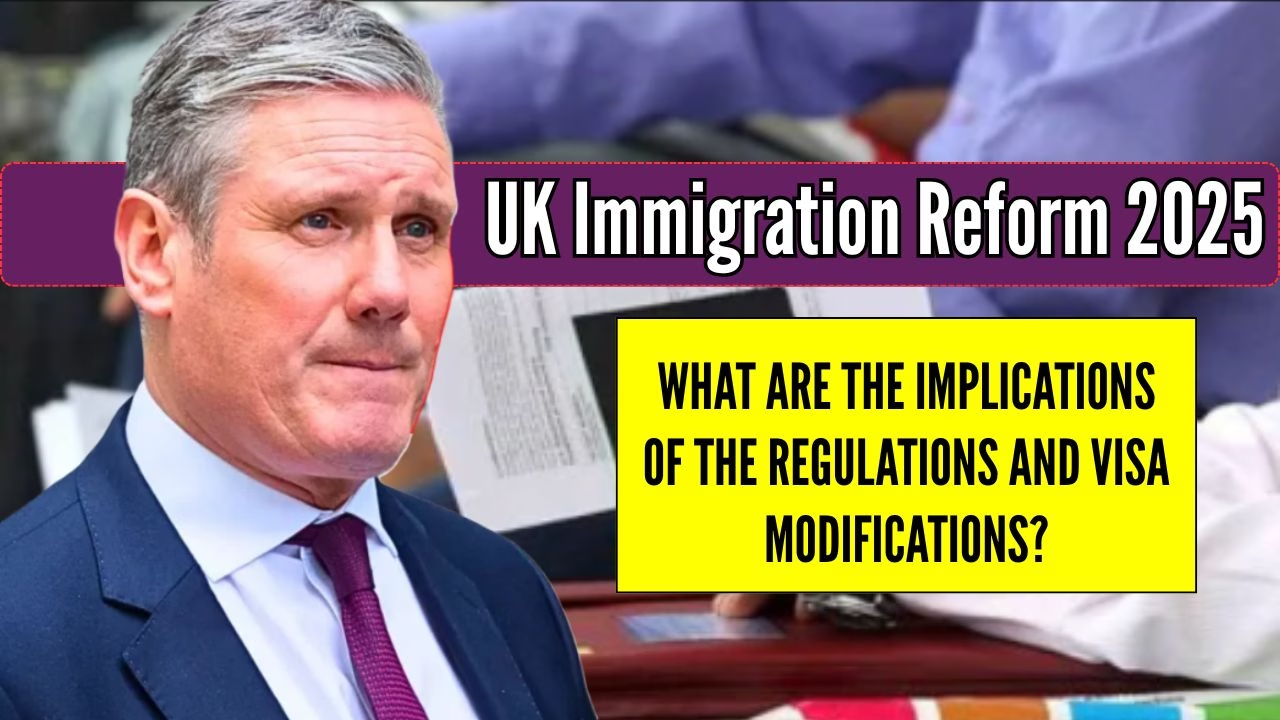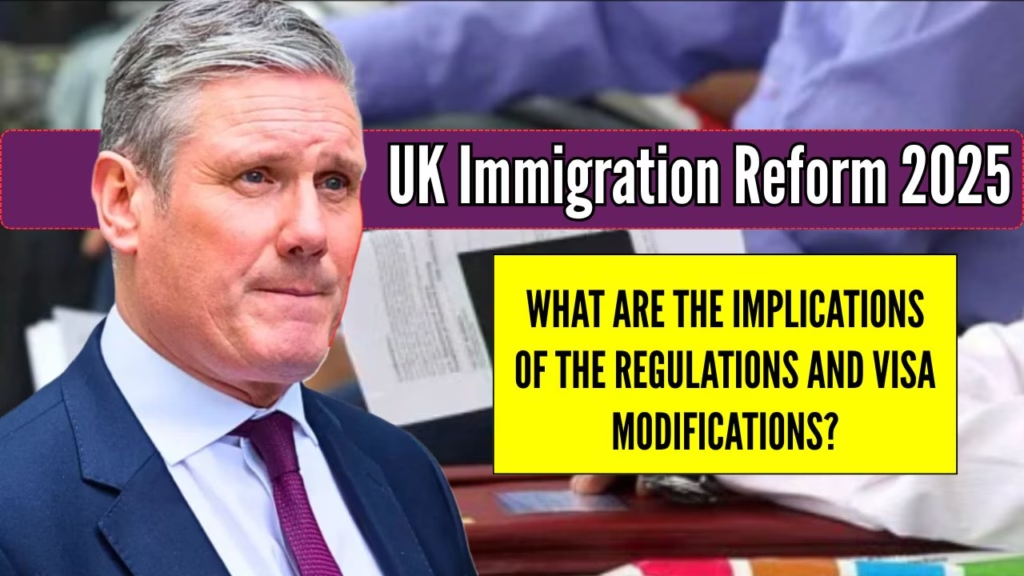UK Immigration Reform 2025: British Prime Minister Keir Starmer published a landmark white paper in May titled Restoring Control over the Immigration System. Restructuring the UK’s legal migration pathways is the goal of the paper, which outlines many suggested modifications. The proposed changes have the potential to drastically alter the entry and stay of foreign researchers, students, and recent graduates in the United Kingdom.
The administration claims that it is still dedicated to luring outstanding talent from across the world, but it is also making strong moves to reduce net migration, particularly by tightening regulations on study and post-study visas. This change offers students in the UK who are planning their academic futures both new options and difficulties. This is a summary of what may alter if these adjustments are implemented.
Will obtaining a UK student visa become more difficult for overseas students?
To make sure that overseas enrollment benefits the UK, the government is putting more pressure on colleges and educational sponsors. Higher passing scores on the Basic Compliance Assessment, mandatory involvement in the Agent Quality Framework, and public ratings that use a new red/amber/green system to monitor sponsor performance are just a few of the more stringent compliance standards that institutions must now meet.
“To form beyond any doubt we are as it were admitting understudies to the UK who are considering at legitimate teach and whose primary purpose is to consider, we are going increment compliance desires for supports,” the paper states. This change is in line with statistics in the report that indicates lower-ranked universities have seen disproportionate increases in the number of student visas. Between 2021 and 2023, student visas for institutions rated 601to 1,200 globally climbed 49%, while those for the top 100 colleges fell 7%.
Canada Minimum Wage Increased to $17.75 in 2025 Big Boost for Workers
Social Security Payout Schedule for June 2025, Who Qualifies and When it will Arrive?
Is the post-study work visa route for UK graduates being shortened?
Indeed, the existing two-year post-study work visa period will be abbreviated to eighteen months, which is able shorten the time outline for trying to find a work or exchanging to another visa way. When it was introduced in 2021, this path was well-liked by students looking for post-graduation career-building chances. However, the government now views it as a cause of long-term, unsustainable migration.
“We’ll abbreviate the Graduate visa course from two years to 18 months and present a requirement on higher education provider pay from worldwide understudies, to be reinvested into the higher education and skills framework,” the declaration states. Another obvious indication of the government’s goal to lessen dependency on foreign talent is the implementation of a financial fee on institutions, which will be used to fund workforce development and local skill training.
Are dependents still allowed to be brought by overseas students?
Concurring to the overview, the number of subordinate visas expanded from 16,000 in 2019 to an astonishing 143,000 in 2023 sometime recently the trend begun to decrease due to the arrangement alterations executed in early 2024. From 2017 to 2019, as it were 5% of think about visas were allowed to dependents; be that as it may, from 2021 to 2023, that rate rose to 20%.
The letter raises worries over integration and work preparedness by clarifying that even though numbers have decreased, “the majority of remaining eligible study visa dependents is still able to come without a requirement to speak English.”
Will foreign students or their dependents be required to speak English more often?
Higher proficiency levels in English will eventually be required of all primary visa applicants and adult dependents. B1-level English is currently enough for the majority of career and educational paths. In addition to implementing a tiered need for dependents that gradually rises from A1 to B2 based on the visa stage, the white paper suggests raising this to B2 for primary applicants, especially those on work visas.
As per the paper, “adult dependents are anticipated to meet A1 on entry, progressing to A2 for expansion, and B2 for settlement. English language requirements will increase to B2 for main visa holders.” Undergraduate and graduate taught students may not be immediately affected, but those who intend to settle or who want to move to a skilled worker visa after graduation should be aware of this.
Are Researchers and PhD Students Impacted?
Under the updated global talent visa route, which the government hopes to promote, PhD students and researchers could discover easier routes. The UK is clearly building up an special case for high-skilled businesses like AI, life sciences, and innovation, development, where it still need to preserve its competitiveness within the worldwide economy, indeed whereas the bigger changes compel movement over the larger part of categories.
“The Worldwide Ability visa will be extended, especially for high-growth divisions like AI, life sciences, and advancement,” the official declaration said. This may result in more mobility, flexibility, and long-term residence choices for PhD applicants and research scientists.
Capital One Settlement 2025: Check June Update , Eligibility and Ongoing Identity Protection
Are colleges in the United Kingdom really penalized for their dependence on foreign students?
Not disciplined, but cautioned. Without guaranteeing quality or results, the government is preventing schools from utilizing foreign student fees to make up for budget deficits. Responsible hiring practices and the necessity to lessen reliance on foreign tuition income are highly valued.
Mechanisms to encourage colleges to adopt more sustainable models include a new fee and more compliance inspections. This is in line with rising worries that certain universities could be using foreign admissions to boost their incomes without proper long-term planning or support systems.
Are these modifications already in place?
A significant change is being signalled by the UK’s 2025 immigration changes, which will replace the current system of unrestricted access with one that is closely linked to skills, strategy, and national workforce planning. These modifications aren’t yet in force, though. These are policy recommendations that were made to Parliament earlier this month and might change as a result of the legislative discussion.
The memo states, “Even though migration has started to decline in the last year, much more work needs to be done to restore order and control to the immigration system.” That being stated, students should anticipate that implementation will start as early as the 2025–26 academic years due to the political urgency and strong government support.
FAQs
What new immigration laws will apply in the UK in 2025?
The government stated that it would implement changes to make it more difficult to obtain permanent residence in the UK, also known as settlement or Indefinite Leave to Remain (ILR), in the Immigration White Paper published on May 12, 2025.
What is the UK’s ten-year immigration rule?
To stay, you need permission (‘leave to remain’). Additionally, you must have maintained “continuous residence,” or ten years of continuous legal residency in the UK.








